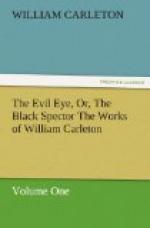“Well, my friend,” said the conjurer, “what’s troubling you?”
“A crock o’ butther, your honor.”
“How is that? explain yourself.”
“Why, sir, a crock o’ butther that was stolen from me; and I’m tould for a sartinty that you can discover the thief o’ the world that stole it.”
“And so I can. Do you suspect anybody?”
“Troth, sir, I can’t say—for I live in a very honest neighborhood. The only two thieves that were in it—Charley Folliott and George Austin—were hanged not long ago, and I don’t know anybody else in the country side that would stale it.”
“What family have you?”
“Three sons, sir.”
“How many daughters?”
“One, sir—but she’s only a girsha” (a little girl).
“I suppose your sons are very good children to you?”
“Betther never broke bread, sir—all but the youngest.”
“What age is he?”
“About nineteen, sir, or goin’ an twenty; but he’s a, heart-scald to me and the family—although he’s his mother’s pet; the divil can’t stand him for dress—and, moreover, he’s given to liquor and card-playin’, and is altogether goin’ to the bad. Widin the last two or three days he has bought himself a new hat, a new pair o’ brogues, and a pair o’ span-new breeches—and, upon my conscience, it wasn’t from me or mine he got the money to buy them.”
The conjurer looked solemnly into his book for some minutes, and then raising his head, fastened his cold, glassy, glittering eyes on the farmer with a glance that filled him with awe.
“I have found it out,” said he; “there are two parties to the theft—your wife and your youngest son. Go to the hucksters of the town, and ask them if they will buy any more butter like the last of yours that they bought, and, depend on it, you will find out the truth.”
“Then you think, sir, it was my wife and son between them that stole the butter?”
“Not a doubt of it, and if you tell them that I said so, they will confess it. You owe me five shillings.”
The farmer put his hand in his pocket, and placing the money before him, left the room, satisfied that there was no earthly subject, past, present, or to come, with which the learned conjurer was not acquainted.
The next individual that came before him was a very pretty buxom widow, who, having made the venerable conjurer a courtesy, sat down and immediately burst into tears.
“What is the matter with you, madam?” asked the astrologer, rather surprised at this unaccountable exhibition of the pathetic.
“O, sir, I lost, about fifteen months ago, one of the best husbands that ever broke the world’s bread.”
Here came another effusion, accompanied with a very distracted blow of the nose.
“That must have been very distressing to you, madam; he must have been extremely fond of such a very pretty wife.”




